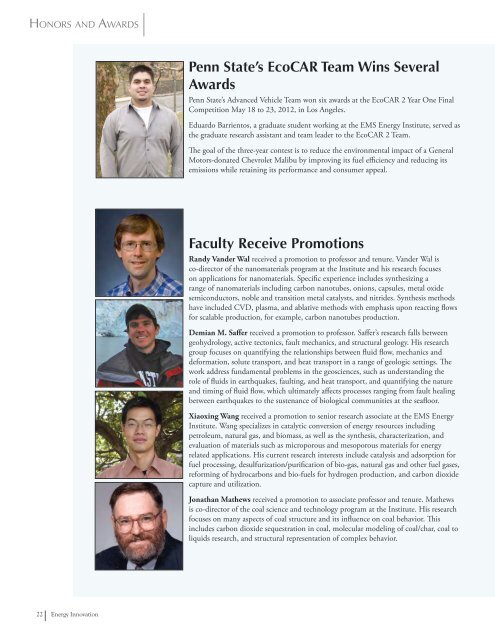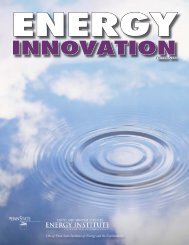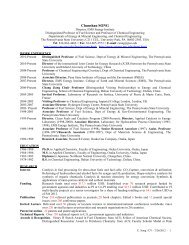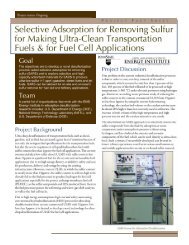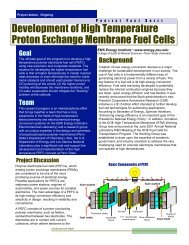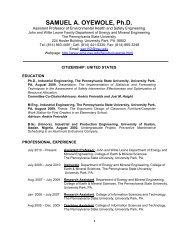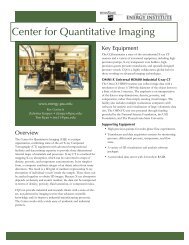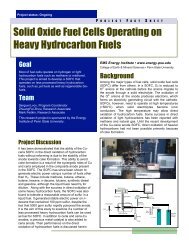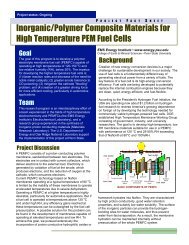Download - EMS Energy Institute - Penn State University
Download - EMS Energy Institute - Penn State University
Download - EMS Energy Institute - Penn State University
Create successful ePaper yourself
Turn your PDF publications into a flip-book with our unique Google optimized e-Paper software.
Honors and Awards<br />
<strong>Penn</strong> <strong>State</strong>’s EcoCAR Team Wins Several<br />
Awards<br />
<strong>Penn</strong> <strong>State</strong>’s Advanced Vehicle Team won six awards at the EcoCAR 2 Year One Final<br />
Competition May 18 to 23, 2012, in Los Angeles.<br />
Eduardo Barrientos, a graduate student working at the <strong>EMS</strong> <strong>Energy</strong> <strong>Institute</strong>, served as<br />
the graduate research assistant and team leader to the EcoCAR 2 Team.<br />
The goal of the three-year contest is to reduce the environmental impact of a General<br />
Motors-donated Chevrolet Malibu by improving its fuel efficiency and reducing its<br />
emissions while retaining its performance and consumer appeal.<br />
Faculty Receive Promotions<br />
Randy Vander Wal received a promotion to professor and tenure. Vander Wal is<br />
co-director of the nanomaterials program at the <strong>Institute</strong> and his research focuses<br />
on applications for nanomaterials. Specific experience includes synthesizing a<br />
range of nanomaterials including carbon nanotubes, onions, capsules, metal oxide<br />
semiconductors, noble and transition metal catalysts, and nitrides. Synthesis methods<br />
have included CVD, plasma, and ablative methods with emphasis upon reacting flows<br />
for scalable production, for example, carbon nanotubes production.<br />
Demian M. Saffer received a promotion to professor. Saffer’s research falls between<br />
geohydrology, active tectonics, fault mechanics, and structural geology. His research<br />
group focuses on quantifying the relationships between fluid flow, mechanics and<br />
deformation, solute transport, and heat transport in a range of geologic settings. The<br />
work address fundamental problems in the geosciences, such as understanding the<br />
role of fluids in earthquakes, faulting, and heat transport, and quantifying the nature<br />
and timing of fluid flow, which ultimately affects processes ranging from fault healing<br />
between earthquakes to the sustenance of biological communities at the seafloor.<br />
Xiaoxing Wang received a promotion to senior research associate at the <strong>EMS</strong> <strong>Energy</strong><br />
<strong>Institute</strong>. Wang specializes in catalytic conversion of energy resources including<br />
petroleum, natural gas, and biomass, as well as the synthesis, characterization, and<br />
evaluation of materials such as microporous and mesoporous materials for energy<br />
related applications. His current research interests include catalysis and adsorption for<br />
fuel processing, desulfurization/purification of bio-gas, natural gas and other fuel gases,<br />
reforming of hydrocarbons and bio-fuels for hydrogen production, and carbon dioxide<br />
capture and utilization.<br />
Jonathan Mathews received a promotion to associate professor and tenure. Mathews<br />
is co-director of the coal science and technology program at the <strong>Institute</strong>. His research<br />
focuses on many aspects of coal structure and its influence on coal behavior. This<br />
includes carbon dioxide sequestration in coal, molecular modeling of coal/char, coal to<br />
liquids research, and structural representation of complex behavior.<br />
22 <strong>Energy</strong> Innovation


